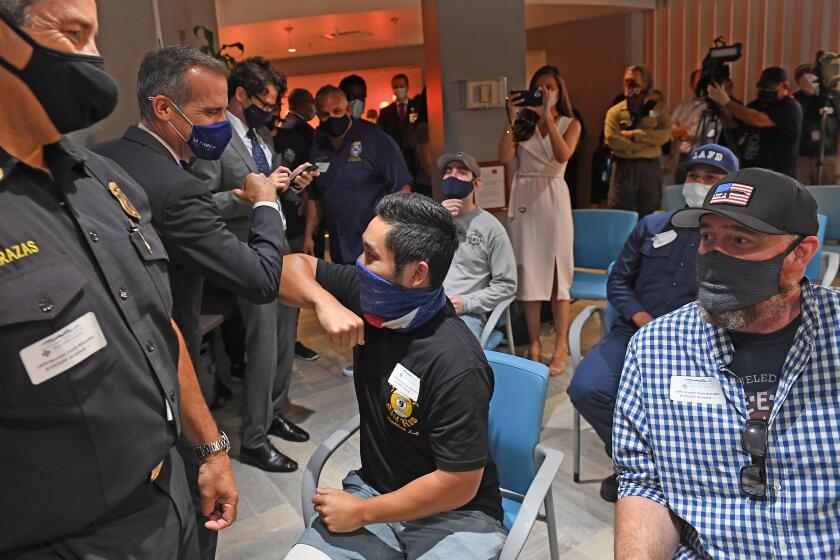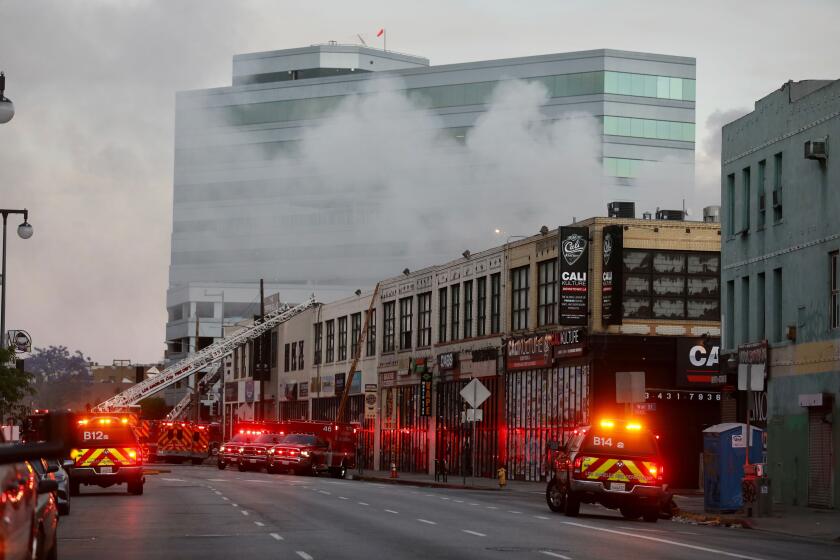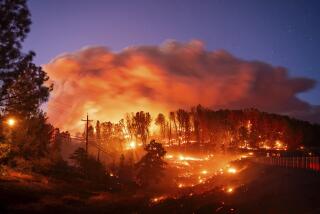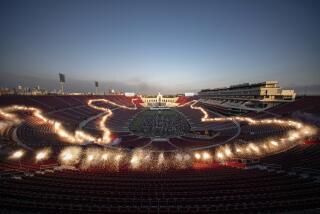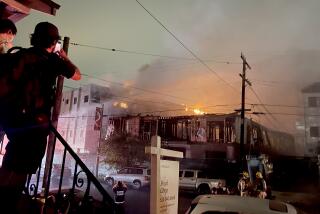Building owners connected to massive downtown L.A. explosion face 300 criminal charges
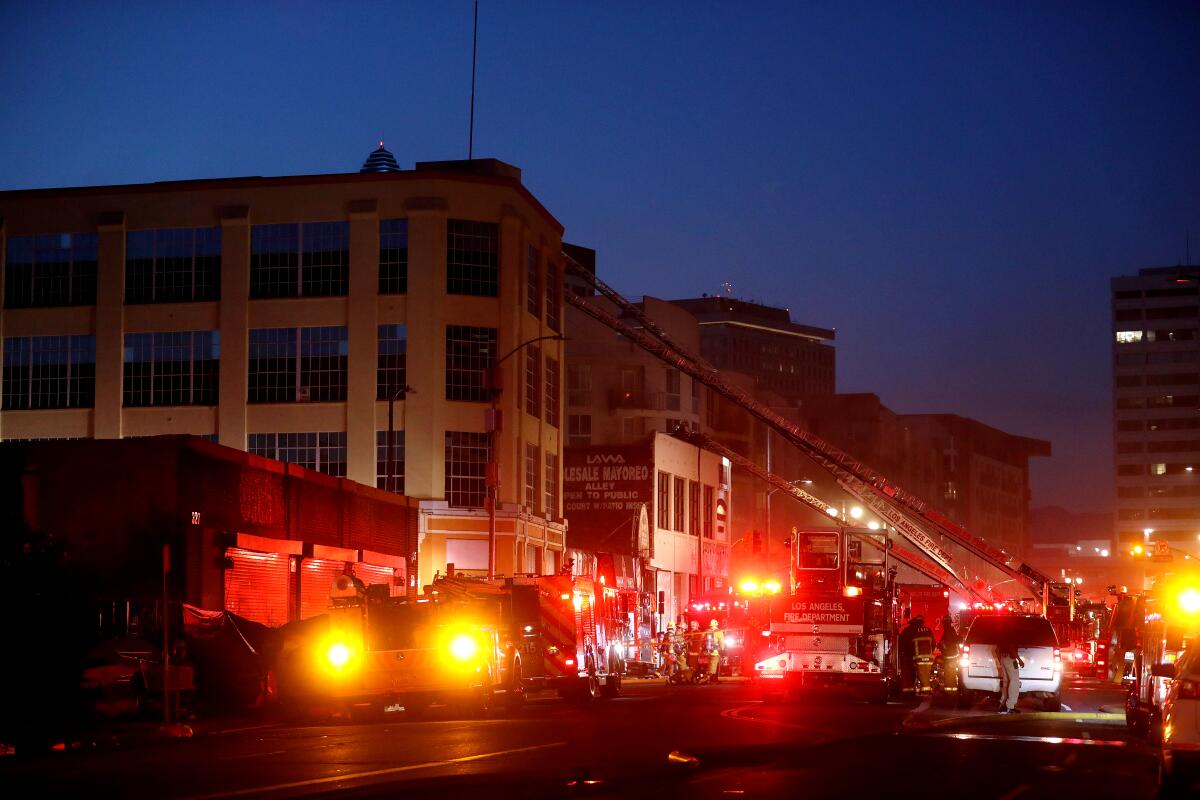
The Los Angeles city attorney on Friday filed more than 300 criminal charges against the owners and operators of four downtown buildings after a massive explosion in May shot a huge fireball into the air over downtown L.A. and left 11 firefighters severely burned.
Prosecutors allege the defendants illegally stored hazardous materials and endangered public health.
The criminal charges stem from an investigation of the May 16 explosion inside an East 3rd Street warehouse by the U.S. Department of Alcohol, Tobacco, Firearms and Explosives as well as the Los Angeles Police Department and other agencies.
While the city attorney’s office can file only misdemeanor charges, including fire or building code violations, prosecutors could choose to bring more serious counts in the future. An ATF spokeswoman said earlier this week that an investigation into the blast is ongoing and a cause had yet to be determined. A spokesperson for the Los Angeles County district attorney’s office said Friday nothing has been presented to the office yet.
The explosion occurred in a section of downtown nicknamed “bong row” because of the concentration of retailers selling rolling papers, butane and other supplies associated with vaping and smoking. The area is also often the subject of complaints from the legal cannabis industry, which says the wholesalers in the downtown warehouse district help supply unlicensed shops.
“The fire and explosion that ripped through the Boyd Street property caused our firefighters great suffering — and came perilously close to costing their lives,” City Atty. Mike Feuer said in a statement released Friday morning. “We’ll do everything we can to hold the owners and operators of buildings and businesses responsible for complying with our fire and safety codes. The public is counting on us to protect them from a potential catastrophe.”
The blast sent 11 firefighters to the hospital, with many suffering severe injuries that have left them physically scarred. Only two of the 11 have been able to return to work, a Los Angeles Fire Department spokesman said. Capt. Victor Aguirre was burned so badly that he lost the use of his hands and had to be hospitalized for more than two months.
Months after a blast severely injured 11 firefighters in downtown L.A., several first responders spoke out about the near-death experience
Authorities said the blaze seemed to start at 327 Boyd St., in a building owned by Steve Sungho Lee that is the location for the businesses Smoke Tokes, Green Buddha and Bio Hazard. It quickly spread to 325 E. Boyd St., also owned by Lee and where Green Buddha and Bio Hazard also allegedly operate. Lee was charged with 36 counts for violations at 327 Boyd St. and 50 counts for violations at 325 Boyd St., according to the charges revealed Friday.
Lee has been charged with 46 additional counts for violations at 309 S. San Pedro St. and three more counts for violations at 5719 S. Avalon Blvd.
An employee at SteLee Industries, Lee’s Little Tokyo business headquarters, said he was not immediately available for comment Friday morning.
Two of Lee’s corporations that are named in the complaint — SL Property Management I LLC and SL Property Management II LLC — were dissolved in mid-June, about a month after the blast, according to filings with the California secretary of state.
Lee has been a notable spender in local elections, contributing tens of thousands of dollars to independent committees that supported City Councilmen Jose Huizar and David Ryu in 2014 and 2015. Huizar has since been charged in a federal corruption case and suspended from the council.
Several days after the blast, a Times reporter and photographer approached Lee at the scene of the fire as ATF investigators scoured the area. Lee asked not to be photographed and suggested he had previous disputes with the owner of Smoke Tokes over the way materials were stored in the facility.
In May, authorities said carbon dioxide and butane canisters were found inside the business. Prosecutors allege all the locations illegally stored hazardous materials.
The owner of Smoke Tokes, Raheel Lakhany, was also named in the court documents made public Friday. He has not responded to prior requests for comment.
In addition to the building owner, Smoke Tokes, as one of the operators of the properties, has also been charged with 36 counts for alleged violations at 327 Boyd and 46 counts for alleged violations at 309 S. San Pedro St. Green Buddha, which is owned by Smoke Tokes, and Bio Hazard are charged with 36 counts for alleged violations at 327 Boyd and 50 counts for alleged violations at 325 Boyd.
A criminal investigation is underway after the warehouse explosion in downtown Los Angeles that injured 12 firefighters and left several buildings damaged, law enforcement sources said.
The center of the initial fire at 327 Boyd that led to the explosion was where prosecutors alleged the most egregious violations occurred. Court documents indicate there was a conspiracy to endanger public health, which included such violations as failure to maintain aisles, failure to have hazmat warning signs, failure to have no smoking signs and failure to classify hazardous commodities. Much of the materials storage, the criminal filings allege, was unpermitted.
Earlier this week, several of the firefighters injured in the blast recounted their harrowing experience. Ian Soriano, a 13-year LAFD veteran who still wears protective coverings on his hand and leg to shield burns he suffered months ago, said the scene “looked like a war zone.”
One of several firefighters who had to escape from the roof of the building, Soriano said he remembers clinging to a ladder surrounded by flames, thinking the worst was about to happen.
“When I was stuck, and I couldn’t move, I was like, I’m done,” Soriano said. “I’m dying right here.”
Times staff writer Emily Alpert Reyes contributed to this report.
More to Read
Sign up for Essential California
The most important California stories and recommendations in your inbox every morning.
You may occasionally receive promotional content from the Los Angeles Times.
